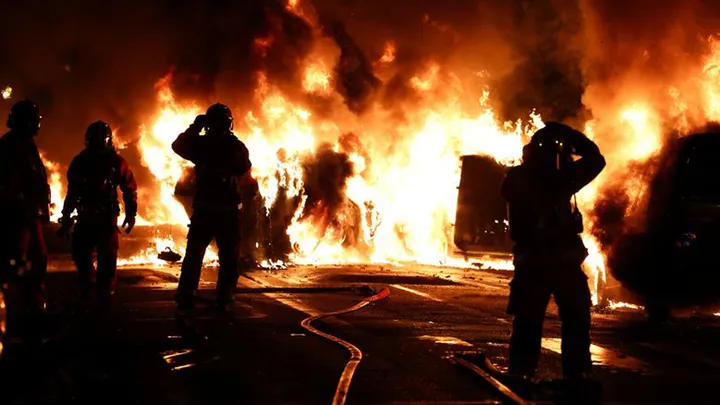
French riots: Riots gripped the suburbs of Paris and quickly spread to other towns and cities in France after a 17-year-old died during a traffic stop, but how did the situation get so out of control?
“What’s happening there is a result of the failure to integrate the country’s Muslim immigrant population,” Alan Mendoza, co-founder and executive director of the Henry Jackson Society, told Fox News Digital.
France Riots: France Deploys Thousands Of Officers to Combat Riots, and Hundreds Arrested
“The France of legend is far removed from the realities of daily life in a ghettoized community that does not have the same opportunities to advance and succeed as the native population,” he said. “France’s forgotten communities show they can no longer be forgotten.”
“A spark was needed to explode the simmering anger among the banlieues and now being taken advantage of by the anarchic strain of French society that welcomes disorder in the form of riots and robberies.”
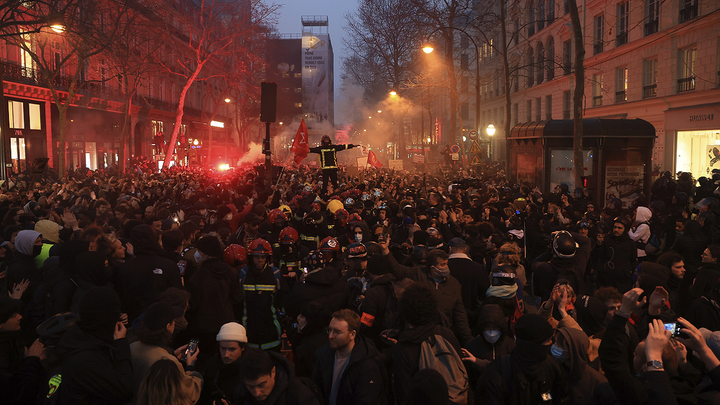
Over a span of five days, the country witnessed a surge of unrest leading to over 2,000 arrests. Consequently, French President Emmanuel Macron decided to postpone his planned visit to Germany. The Minister of the Interior in France disclosed that the average age of those detained was 17.
Gregory Joron, the Secretary-General of the Unite SGP Police FO union, expressed that the widespread urban violence witnessed across numerous cities in France had not been seen in the past 18 years.
On Tuesday morning, a teenager named Nahel M., who worked as a delivery driver, was stopped by the police in the Paris suburb of Nanterre. The police officers approached his vehicle to explain that he had violated traffic regulations, as stated by a prosecutor.
Riots in France: More than 1,300 People Arrested, riots Sparked by Police Killing of Teen
However, the exact trigger for the incident remains unclear, partly due to conflicting accounts between the police reports and the video circulated on social media. While the police claim that Nahel drove his car towards one of the officers, the video allegedly shows an officer pointing a weapon at Nahel and threatening, “You are going to get a bullet in the head,” as reported by France24.
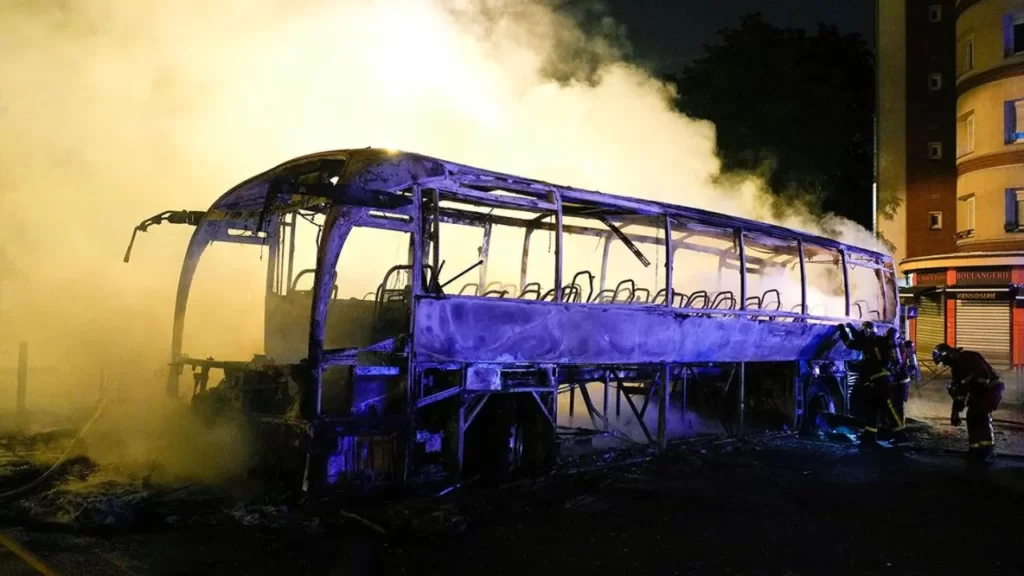
Nahel was driving a yellow Mercedes with two passengers in the car, and he did not possess a driver’s license at the time. It has been reported that he was previously detained for failing to comply with a traffic stop, and he was scheduled to appear in juvenile court in September.
After the car suddenly drove away, the officer apparently shot Nahel, who tragically died at the scene shortly after the incident. The police took the responsible officer into custody and launched an investigation, resulting in charges of voluntary manslaughter being filed against him on Friday.
According to a report by Reuters, the officer’s lawyer, Laurent-Franck Lienard, stated in an interview with French television that his client had intended to shoot at the driver’s leg. However, due to the car’s sudden movement, the officer was jolted and ended up shooting toward the driver’s chest instead. Lienard emphasized that it was clear his client did not have any intention to cause the driver’s death.
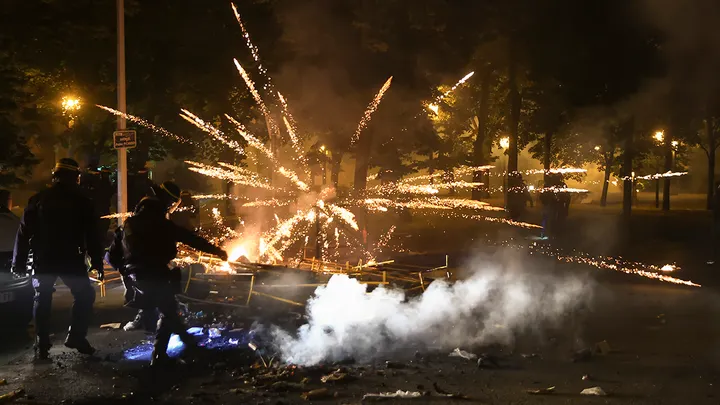
Nahel, who had Algerian and Moroccan heritage, had no previous criminal record, according to a lawyer representing his family. He was actively involved in a local rugby club and participated in a program designed to assist individuals from underprivileged areas in obtaining apprenticeships. Nahel had aspirations of becoming an electrician.
Regarding the crisis, President Macron’s response has been a mix of different viewpoints. Initially, he described the shooting as “unforgivable” and “inexplicable.” However, he later criticized the protests and attributed the escalating violence to various factors, including social media and video games.
Macron argued that social media platforms such as TikTok and Snapchat played a role in fueling the riots, particularly when personal information about the officer involved in Nahel’s shooting was shared on these platforms. He expressed his government’s intention to collaborate with social media companies to remove “sensitive content” and identify users who “incite disorder or contribute to the violence.” Macron also denied the existence of systemic racism within the country’s law enforcement agencies.
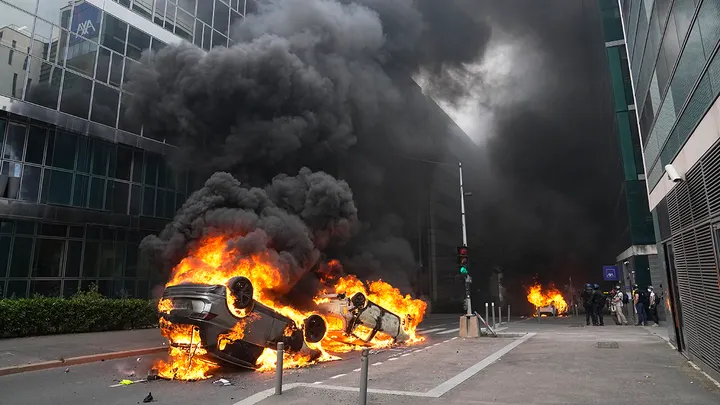
On Saturday, President Macron decided to cancel his trip to Germany in order to address the ongoing crisis within the country, despite facing controversy for attending an Elton John concert while protests and violent clashes were escalating.
To address the protests, Macron called for an emergency meeting of the National Assembly to determine the appropriate course of action. Eventually, it was decided to deploy 45,000 officers and armored vehicles in an attempt to suppress the protests. Initially, only around 9,000 officers had been deployed by law enforcement agencies.

According to Reuters, the situation appeared to be somewhat calmer by Saturday night, although sporadic violence continued to occur in various parts of the country, including Marseille and Nice. In Paris, where the Olympic Games are scheduled for next year, additional officers were deployed to safeguard the Champs Elysees avenue in response to calls on social media for protesters to gather there.
When questioned on a TV news channel about the possibility of declaring a state of emergency, France’s Interior Minister, Gerald Darmanin, stated, “We are not ruling out any possibility, and we will assess the situation after tonight to determine the decision of the President of the Republic.”